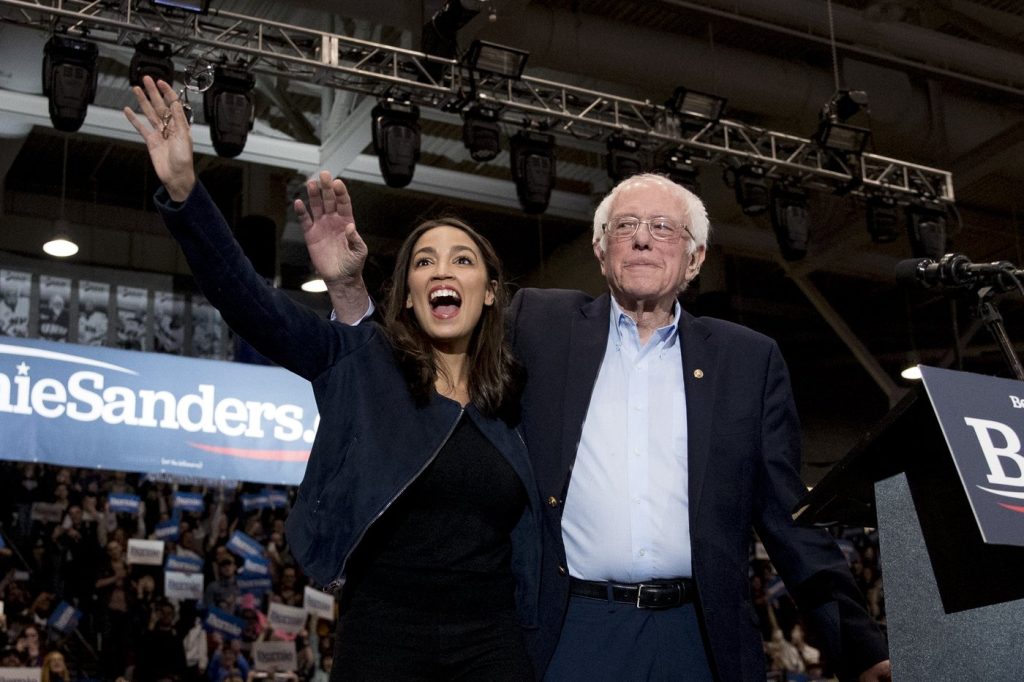Senate Minority Leader Chuck Schumer exercises considerable influence among Democrats in Congress, unlike New York Representative Alexandria Ocasio-Cortez and Vermont Senator Bernie Sanders. However, Ocasio-Cortez and Sanders have garnered substantial grassroots support among Democratic voters nationwide. According to a recent survey from the AP-NORC Center for Public Affairs Research, approximately 75% of Democrats hold a “somewhat” or “very” favorable view of Sanders, compared to around 50% for Ocasio-Cortez. In stark contrast, Schumer's favorable rating sits at about a mere one-third of Democrats.
The differences in favorability between Sanders and Ocasio-Cortez are largely attributed to voters who expressed uncertainty in forming an opinion about AOC. Both figures possess similar unfavorable ratings among Democrats, hovering around 15%. Ocasio-Cortez, now at the age of 35, was once an anonymous volunteer for Sanders’ presidential campaign ten years ago. She is now in a position to potentially succeed the 83-year-old Sanders as a leader of the progressive movement within the Democratic Party, especially as it seeks to navigate the political landscape shaped by former President Donald Trump.
This significant role, however, carries risks, as Trump and the Republican Party have long targeted Ocasio-Cortez, particularly portraying her as a polarizing figure. Some Democrats from both the progressive and moderate wings have criticized her and Sanders for being excessively disruptive and promoting unrealistic policy initiatives.
Ocasio-Cortez and Sanders have often characterized their political relationship as familial; she has famously referred to him as “Tio Bernie” in Spanish, or “Uncle Bernie.” Recently, during a public appearance, Sanders playfully called her his "daughter," highlighting the close bond they share. Sanders’ spokesperson, Anna Bahr, emphasized that the duo are “allies, collaborators, and friends who built their relationship around a shared vision” focused on advocating for working-class issues.
In 2018, Ocasio-Cortez made a dramatic entrance into the political arena by defeating Rep. Joe Crowley in a primary election, aided by progressive organizations linked to Sanders’ campaign. After her victory, she quickly became a notable figure in Democratic politics. Later that year, she and Sanders campaigned together for other progressive candidates, solidifying their partnership.
By 2019, Ocasio-Cortez introduced the Green New Deal, a bold initiative aimed at transitioning the U.S. economy away from fossil fuels and towards sustainable practices, alongside proposals for health care coverage, job guarantees, and affordable housing. Despite its unbinding nature, the Green New Deal became a central topic in the 2020 Democratic primary, earning criticism from both Republicans and some Democrats concerning its feasibility and associated costs.
As Sanders faced health challenges during his second presidential bid, Ocasio-Cortez endorsed him publicly, which provided a much-needed boost to his campaign. Her support was pivotal during rallies in key early primary states like Iowa and New Hampshire, further establishing her influence.
Following Sanders’ loss in the 2020 Democratic primary, he and Ocasio-Cortez continued to share platforms, supporting not only progressive policies but also figures within the Democratic Party, including campaigning for Vice President Kamala Harris. As of 2025, with Trump’s political resurgence affecting Democrats, Sanders initiated his “Fighting Oligarchy” tour to renew the party’s focus on the working class’s needs. Ocasio-Cortez joined him, recalling how Sanders inspired her to enter politics and advocating for equitable health care access.
Although Sanders has stated he will not run for president in 2028, he has expressed deep respect and familial regard towards Ocasio-Cortez, noting her journey from being a waitress to a powerful political figure who stood against significant odds. Their relationship exemplifies the blending of political lineage and the continuous fight for progressive ideals within the Democratic Party.











